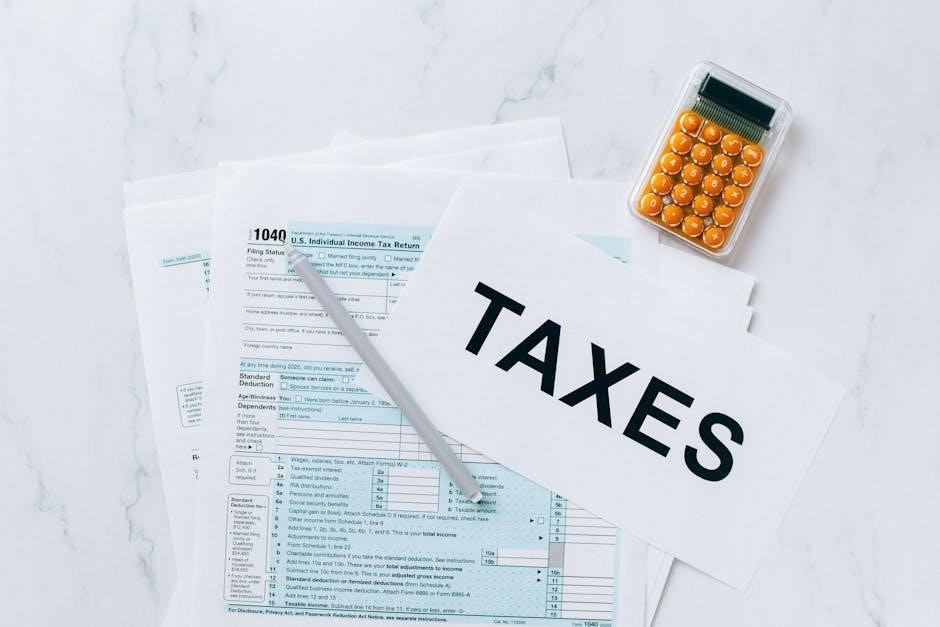The Income Tax Ordinance 2001 is a comprehensive law governing taxation in Pakistan, established to regulate income tax collection and administration by the Federal Board of Revenue effectively.
1.1 Overview of the Ordinance
The Income Tax Ordinance 2001 is a key piece of legislation in Pakistan, outlining the framework for income tax assessment, collection, and administration. It provides detailed rules for taxable income, exemptions, and compliance procedures, ensuring fair and efficient tax governance. The Ordinance is regularly updated to align with economic changes and remains a cornerstone of Pakistan’s tax system.
1.2 Historical Context and Importance
Enacted in 2001, the Income Tax Ordinance replaced earlier tax laws, modernizing Pakistan’s tax framework; It aimed to streamline tax administration, enhance revenue collection, and promote economic growth. Over the years, it has been amended to address evolving economic needs, ensuring compliance with global tax standards and maintaining its role as a foundational pillar of Pakistan’s fiscal policy and governance.

Key Amendments and Updates to the Ordinance
The Income Tax Ordinance 2001 has undergone significant amendments in 2023 and 2024, introducing new provisions to enhance tax compliance and align with global standards effectively.
2.1 Recent Amendments (2023-2024)
Recent amendments to the Income Tax Ordinance 2001 in 2023 and 2024 focus on enhancing tax compliance, modernizing provisions, and aligning with global tax systems. Key updates include revisions to tax rates, expanded definitions of taxable income, and new exemptions for specific sectors. These changes aim to streamline tax administration, reduce evasion, and promote transparency, ensuring the ordinance remains effective in Pakistan’s evolving economic landscape.
2.2 Significant Changes Over the Years
Over the years, the Income Tax Ordinance 2001 has undergone significant changes to adapt to economic shifts and legal requirements. Key updates include clarifications on taxable income in 2006, enhanced exemptions for local governments by 2010, and revisions to foreign income taxation in 2012. These adjustments reflect Pakistan’s commitment to aligning its tax framework with global standards and fostering economic stability.
Taxable Income Under the Ordinance
Taxable income under the Ordinance includes all income earned by individuals and businesses, such as salary, business profits, and capital gains, subject to applicable exemptions and deductions.
3.1 Definition and Scope of Taxable Income
Taxable income under the Ordinance is defined as all income earned by individuals and businesses, including salary, business profits, capital gains, and rental income, subject to specific exemptions. It encompasses income from all sources within and outside Pakistan, ensuring a broad scope of taxation. The Ordinance provides clarity on what constitutes taxable income, aligning with global tax principles to ensure fairness and compliance.
3.2 Specific Inclusions and Exclusions
The Ordinance specifies that taxable income includes salary, business profits, rental income, and capital gains, while excluding certain incomes like those of provincial and local governments. Foreign income is also addressed, with specific exemptions for residents under certain conditions. These definitions ensure clarity in determining what is taxable, aligning with the Ordinance’s objectives of fair and equitable taxation.

Tax Exemptions and Reliefs
The Ordinance provides exemptions for residential property income and provincial/local government income, ensuring certain revenues remain tax-free to support public services and individual welfare effectively.
4.1 Residential Property Income Exemption
The Income Tax Ordinance 2001 grants exemptions for residential property income, ensuring rental income from residential properties is tax-free under specific conditions. This provision aims to encourage homeownership and investment in the housing sector while providing relief to individuals who derive income from residential properties. The exemption aligns with broader economic goals of promoting affordable housing and supporting middle-income families in Pakistan.
4.2 Provincial and Local Government Income Exemption
The Income Tax Ordinance 2001 exempts income derived by Provincial and Local Governments from taxation. This provision ensures that revenue generated through taxes, fees, or other sources by these entities remains non-taxable, enabling them to allocate resources effectively for public services and infrastructure development, aligning with the Ordinance’s objective to support governance and public welfare initiatives in Pakistan.

Taxation of Foreign Income
The Income Tax Ordinance 2001 regulates the taxation of foreign income earned by residents and businesses in Pakistan, ensuring compliance with international tax standards and agreements.
5.1 Foreign Source Salary Taxation
The Income Tax Ordinance 2001 addresses the taxation of foreign source salaries, particularly for resident individuals. Section 102 of the Ordinance specifies that foreign salaries are taxable in Pakistan if received by a resident. The Federal Board of Revenue ensures compliance, with exemptions for non-residents under specific conditions. This provision aligns with international tax principles and ensures fair revenue collection.
5.2 Taxation of Foreign Income for Residents
Under the Income Tax Ordinance 2001, residents are taxed on their worldwide income, including foreign income. Section 102 specifically addresses foreign source salaries, while broader provisions cover other foreign income like investments or rentals. The Federal Board of Revenue enforces compliance, requiring residents to report all foreign income. Exemptions may apply under tax treaties to prevent double taxation. Penalties for non-compliance can include fines. Recent amendments ensure updated regulations align with international standards and domestic revenue goals.

Compliance and Filing Requirements
The Income Tax Ordinance 2001 mandates strict compliance and timely filing of tax returns by individuals and businesses, enforced by the Federal Board of Revenue (FBR). Accurate documentation and adherence to deadlines are crucial to avoid penalties and ensure proper tax administration.
6.1 Filing Procedures for Individuals
Individuals must file their tax returns annually with the Federal Board of Revenue (FBR), providing accurate financial details and supporting documents. The process involves registering for a tax ID, submitting income statements, and declaring all taxable income. Timely filing is crucial to avoid penalties, with extensions granted under specific circumstances. The FBR offers online portals for convenient submission, ensuring compliance with the Income Tax Ordinance 2001.
6.2 Documentation and Record-Keeping
Individuals and businesses must maintain detailed financial records, including receipts, invoices, and bank statements, to support tax filings. Documentation must be retained for at least six years, as specified by the FBR. Accurate record-keeping ensures compliance with the Income Tax Ordinance 2001, facilitating audit processes and verifying income declarations. Proper documentation is essential for resolving disputes and ensuring accurate tax assessments by authorities.

Penalties and Enforcement
The Federal Board of Revenue enforces compliance with strict penalties for non-compliance, ensuring adherence to the Income Tax Ordinance 2001 through legal frameworks and regulatory measures.
7.1 Consequences of Non-Compliance
Non-compliance with the Income Tax Ordinance 2001 results in penalties, including fines and imprisonment, under sections like 164, 191, and 192. The Federal Board of Revenue imposes these penalties to ensure adherence to tax laws, with additional measures such as freezing assets or prosecuting offenders to maintain compliance. The severity of penalties depends on the nature and extent of violations.
7.2 Enforcement Mechanisms by the Federal Board of Revenue
The Federal Board of Revenue (FBR) enforces the Income Tax Ordinance 2001 through audits, inspections, and legal actions. It uses digital systems to monitor compliance and detect evasion. Non-compliant individuals and businesses face penalties, asset freezing, or legal proceedings. The FBR also collaborates with international bodies to combat tax evasion, ensuring adherence to the ordinance and maintaining revenue integrity effectively.
Digital Access and Availability of the Ordinance
The Income Tax Ordinance 2001 is accessible in PDF format on official sources like the FBR website, ensuring easy access to updated tax laws and amendments.
8.1 PDF Versions and Official Sources
The Income Tax Ordinance 2001 is available in PDF format on the Federal Board of Revenue (FBR) website, ensuring easy digital access to updated tax laws and regulations. Official sources include FBR notifications, such as S.R.O. 381(1)/2002, which provide detailed amendments and clarifications. Digital availability enhances transparency and simplifies compliance for taxpayers and professionals.
8.2 Importance of Digital Accessibility
Digital accessibility of the Income Tax Ordinance 2001 ensures transparency and ease of understanding for taxpayers. PDF versions provide quick access to updated laws, enabling individuals and businesses to comply efficiently. This digital availability fosters a well-informed tax community, reducing compliance burdens and promoting adherence to legal requirements effectively.

Impact on Individuals and Businesses
The Income Tax Ordinance 2001 significantly influences personal finances and business operations by regulating taxable income, exemptions, and compliance requirements, ensuring fair taxation and economic stability.
9.1 Implications for Personal Finances
The Income Tax Ordinance 2001 impacts individuals by defining taxable income, exemptions, and filing requirements, influencing personal financial planning, savings, and investment decisions while ensuring compliance with legal obligations to avoid penalties and maintain financial stability.
9.2 Effects on Business Operations
The Income Tax Ordinance 2001 significantly influences business operations by outlining tax liabilities, deductions, and compliance requirements, impacting financial planning and investment strategies. Businesses must adapt to tax rates, exemptions, and record-keeping rules, ensuring adherence to legal standards to maintain operational efficiency and avoid penalties, ultimately shaping their overall financial health and growth prospects.
Comparative Analysis with Other Tax Laws
The Income Tax Ordinance 2001 aligns with regional tax policies, incorporating exemptions for provincial governments and addressing foreign income taxation, fostering harmony with neighboring countries’ fiscal frameworks.
10.1 Comparison with International Tax Systems
The Income Tax Ordinance 2001 mirrors global tax practices, such as exemptions for foreign-source salaries and provincial incomes, aligning with international norms. Recent amendments (2023-2024) reflect modern tax reforms, ensuring compliance with OECD standards and fostering cross-border tax cooperation. The Federal Board of Revenue’s digital initiatives further enhance transparency, bringing Pakistan’s tax system closer to international best practices and facilitating global economic integration effectively;
10.2 Alignment with Regional Tax Policies
The Income Tax Ordinance 2001 aligns with regional tax policies by adopting similar exemptions and incentives found in neighboring countries. Provincial income exemptions mirror regional practices, fostering economic harmony. Recent amendments (2023-2024) ensure compatibility with South Asian and Middle Eastern tax reforms, promoting cross-border investments and maintaining competitiveness within the regional economic landscape effectively.

Role of the Federal Board of Revenue (FBR)
The Federal Board of Revenue (FBR) oversees the implementation of the Income Tax Ordinance 2001, ensuring effective tax administration, collection, and enforcement to promote compliance and revenue generation.
11.1 Responsibilities in Implementing the Ordinance
The Federal Board of Revenue (FBR) is responsible for interpreting and enforcing the Income Tax Ordinance 2001. It oversees tax collection, ensures compliance, and provides guidance to taxpayers. The FBR also manages digital platforms for tax filings and updates the ordinance to align with economic needs. Its role is crucial in maintaining transparency and efficiency in Pakistan’s tax system.
11.2 Recent Initiatives by the FBR
The Federal Board of Revenue (FBR) has introduced digital solutions like the Tax Asaan app and an updated web portal to simplify tax filings. These initiatives aim to enhance transparency and convenience for taxpayers, reducing errors and processing times. Additionally, the FBR has implemented real-time monitoring systems to improve compliance and combat tax evasion effectively.
These efforts align with the FBR’s goal of modernizing tax administration and fostering a culture of compliance in Pakistan.

Future Prospects and Reforms
The Income Tax Ordinance 2001 is expected to undergo modernization, focusing on digital platforms and aligning with global tax standards to enhance efficiency and compliance.
12.1 Proposed Reforms and Modernization
The Federal Board of Revenue has proposed reforms to the Income Tax Ordinance 2001, focusing on digital transformation and simplifying tax processes. These reforms aim to enhance transparency, reduce compliance burdens, and align the tax system with global standards. Modernization efforts include integrating technology for easier filing and payment systems, ensuring fair taxation, and promoting economic growth through streamlined regulations.
12.2 Expected Impact of Future Changes
The proposed reforms to the Income Tax Ordinance 2001 are expected to streamline tax processes, reduce compliance costs, and promote economic growth. Future changes may simplify tax rates, enhance digital infrastructure, and improve taxpayer services. These updates aim to foster a more equitable and efficient tax system, encouraging investment and adherence to tax obligations while addressing modern economic challenges effectively.
